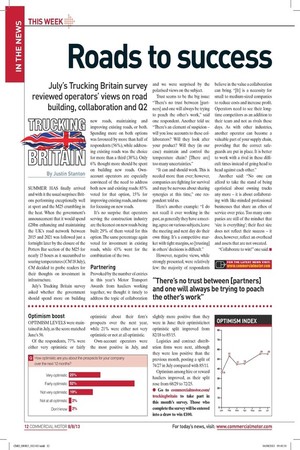Roads to success
Page 9

If you've noticed an error in this article please click here to report it so we can fix it.
July's Trucking Britain survey reviewed operators views on road building, collaboration and Q2
SUMMER HAS finally arrived and with it the usual surprises: Britons performing exceptionally well at sport and the M25 crumbling in the heat. When the government's announcement that it would spend £28bn enhancing and maintaining the UK's road network between 2015 and 2021 was followed just a fortnight later by the closure of the Potters Bar section of the M25 for nearly 15 hours as it succumbed to soaring temperatures ( CM18 July), CM decided to probe readers for their thoughts on investment in infrastructure. July's Trucking Britain survey asked whether the government should spend more on building • • • • • • • • • • • • • • • • •
new roads, maintaining and improving existing roads, or both. Spending more on both options was favoured by more than half of respondents (56%), while addressing existing roads was the choice for more than a third (38%). Only 6% thought more should be spent on building new roads. Ownaccount operators are especially convinced of the need to address both new and existing roads: 85% voted for that option, 15% for improving existing roads, and none for focusing on new roads.
It's no surprise that operators serving the construction industry are the keenest on new roads being built: 29% of them voted for this option. The same percentage again voted for investment in existing roads, while 43% went for the combination of the two.
Partnering
Provoked by the number of entries in this year's Motor Transport Awards from hauliers working together, we thought it timely to address the topic of collaboration • • • • • • • • • • • • • • • • •
and we were surprised by the polarised views on the subject.
Trust seems to be the big issue: "There's no trust between [partners] and one will always be trying to poach the other's work," said one respondent. Another told us: "There's an element of suspicion — will you lose accounts to these collaborators? Will they look after your product? Will they (in our case) maintain and control the temperature chain? [There are] too many uncertainties."
"It can and should work. This is needed more than ever; however, companies are fighting for survival and may be nervous about sharing synergies at this time," one respondent told us.
Here's another example: "I do not recall it ever working in the past, as generally they have a meeting, agree on various subjects, leave the meeting and next day do their own thing. It's a competitive market with tight margins, so [trusting] in others' decisions is difficult." However, negative views, while strongly presented, were relatively few: the majority of respondents
believe in the value a collaboration can bring. "[It] is a necessity for small to medium-sized companies to reduce costs and increase profit. Operators need to see their longtime competitors as an addition to their team and not as rivals these days. As with other industries, another operator can become a valuable part of your supply chain, providing that the correct safeguards are put in place. It is better to work with a rival in these difficult times instead of going head to head against each other."
Another said: "No one can afford to take the stand of being egotistical about owning trucks any more — it is about collaborating with like-minded professional businesses that share an ethos of service over price. Too many companies are still of the mindset that 'size is everything'; their fleet size does not reflect their success — it does, however, reflect an overhead and assets that are not sweated. "Collaborate to win!" one said. •









































